
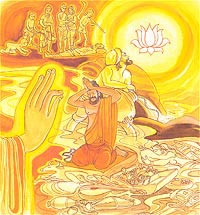
Verse 383. Be A Knower Of The Deathless
O brahmin, strive and cleave the stream,
desires of sense discarded,
knowing conditioned things decay
be Knower-of-the-Uncreated.
Explanation: Exert all you can and cut off the stream of existence. Get rid of passion. Get to know the erosion of the condition things. And, they become the knower of the uncreated – Nibbana.
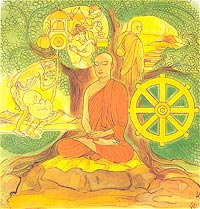
Verse 384. Cultivate Concentration
When by the twofold Dhamma
a Brahmin’s gone beyond
all the bonds of One-who-Knows
have wholly disappeared.
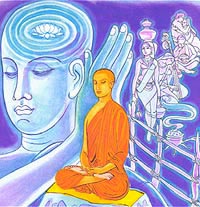
Verse 385. The Unfettered Person Is A Brahmana
For whom is found no near or far,
for whom’s no near or far,
free of fear and fetter-free,
that one I call a Brahmin True.
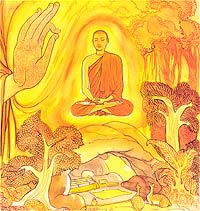
Verse 386. Who Is Contemplative And Pure Is A Brahmin
Seated stainless, concentrated,
who’s work is done, who’s free of taints,
having attained the highest aim,
that one I call a Brahmin True.
Explanation: He is given to concentrated contemplation. He is free of all blemishes – the dust that defiles a being. He sits in solitude. All his spiritual tasks and obligations are done. He has reached the highest goal. That person I describe as a brahmana.
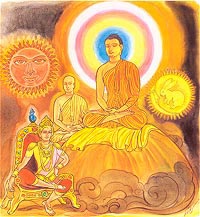
Verse 387. The Buddha Shines Day And Night
The sun is bright by day,
the moon enlights the night,
armoured shines the warrior,
contemplative the Brahmin True.
But all day and night-time too
resplendent does the Buddha shine.
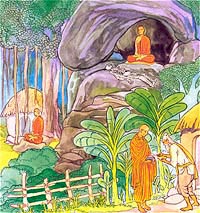
Verse 388. He Who Had Discarded All Evil Is Holy
By barring-out badness a ‘brahmin’ one’s called
and one is a monk by conduct serene,
banishing blemishes out of oneself
therefore one’s known as ‘one who has left home.
Note: brahmano, samano, pabbajito: a brahmin, a monk a wandering ascetic. These are all categories of priests in the religious landscape of the Buddha’s day. They pursued a multitude of religious paths. Here the Buddha explains who a real priest, monk or a brahmin is.
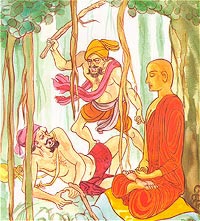
Verse 389. Harm Not An Arahat
One should not a brahmin beat
nor for that should He react.
Shame! Who would a Brahmin beat,
more shame for any should they react.
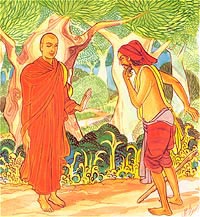
Verse 390. An Arahat Does Not Retaliate
For brahmin no small benefit
when mind’s aloof from what is dear.
As much he turns away from harm
so much indeed does dukkha die.
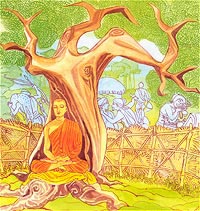
Verse 391. The Well-Restrained Is Truly A Brahmin
In whom there is no wrong-doing
by body, speech or mind,
in these three ways restrained,
that one I call a Brahmin True.
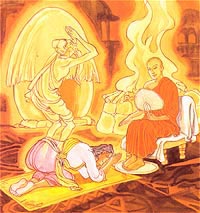
Verse 392. Honour To Whom Honour Is Due
From whom one knows the Dhamma
by Perfect Buddha taught
devoutly one should honour them
Explanation: If a seeker after truth were to learn the Word of the Enlightened One from a teacher, that pupil must pay the Teacher due respect, like a brahmin paying homage assiduously and with respect to the sacrificial fire.
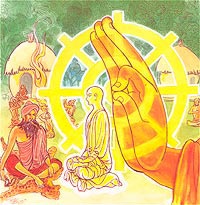
Verse 393. One Does Not Become A Brahmin Merely By Birth
By birth one is no brahmin,
by family, austerity.
In whom are truth and Dhamma too
pure is he, a Brahmin’s he.
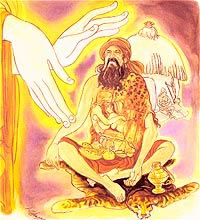
Verse 394. Be Pure Within
What’s the coiled hair for?
For what your cloak of skins?
Within you are acquisitive,
you decorate without.
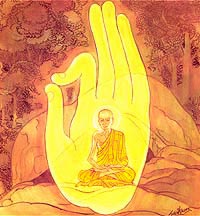
Verse 395. Who Meditates Alone in the Forest Is A Brahmana
One enduring rag-robes, lean,
with body o’er spread by veins,
lone in the woods who meditates,
that one I call a Brahmin True.
Explanation:He wears robs made of cast off rags. He is so austere and lean that veins stand out in his body. All alone, he meditates in the forest. Such a seeker if truth, I describe as a brahmano.
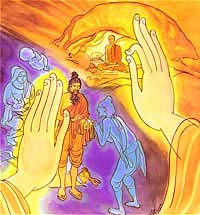
Verse 396. Non-Possessive And The Non-Attached Person Is A Brahmana
I call him a brahmin though
by womb-born mother’s lineage,
he’s just supercilious
if with sense of ownership,
owning nothing and unattached:
that one I call a Brahmin True.
Explanation: I would not call a person a brahmana merely because he was born out of a brahmana mother’s womb. Nor would I call a person a brahmin merely because he goes about addressing people as sir. These people are full of defilements. I call a person a brahmin who is free of faults and is not given to craving.
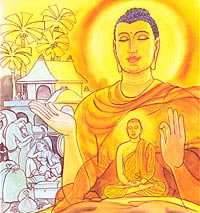
Verse 397. A Brahmana Is He Who Has Destroyed All Fetters
Who fetters all has severed
does tremble not at all,
who’s gone beyond all bond, unyoked,
that one I call a Brahmin True.
Explanation:He has got rid of all fetters; in consequence, he is free of trepidation and is fearless. He has travelled beyond all bonds. Disengaged from bonds, he is no longer tied to the world. Such a person I describe as a brahmana.
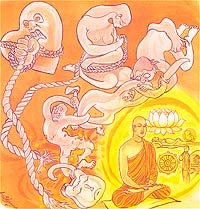
Verse 398. A Brahmana Is He Who Has No Hatred
When cutting strap and reins,
the rope and bridle too,
tipping the shaft, he’s Waked,
that one I call a Brahmin True.
Explanation:He has got rid of the strap of ill-will. He has freed himself from the thong of craving. He has escaped the large shackle breaking all its links. These are the false views that curb the people. He has taken off the cross-bar of ignorance. He has become aware of the four noble truths. That person, I describe as a brahmana.
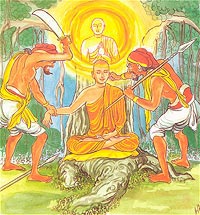
Verse 399. A Brahmana Is He Who Is Patient
Who angerless endures abuse.
Beating and imprisonment,
with patience’s power, an armed might:
that one I call a Brahmin True.
Explanation:He is abused and insulted. He is tortured, imprisoned and bound up. But he endures all these without being provoked or without losing his temper. Such an individual who has patience as his power and his army, I describe as a true brahmano.
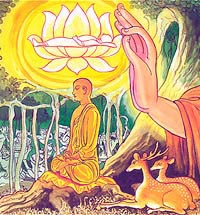
Verse 400. A Brahmana Is He Who Is Not Wrathful
Who’s angerless and dutiful,
of virtue full and free of lust,
who’s tamed, to final body come,
that one I call a Brahmin True.
Explanation: He is free of anger. He carefully performs his
religious duties and is mindful of the observances. He is disciplined
in terms of virtuous behaviour. He is restrained. This is the final
body he will occupy as he has ended his cycle of births. I call that
person a brahmana.
Verse 400. A Brahmana Is He Who Is Not Wrathful
Who’s angerless and dutiful,
of virtue full and free of lust,
who’s tamed, to final body come,
that one I call a Brahmin True.
Explanation: He is free of anger. He carefully performs his religious duties and is mindful of the observances. He is disciplined in terms of virtuous behaviour. He is restrained. This is the final body he will occupy as he has ended his cycle of births. I call that person a brahmana.
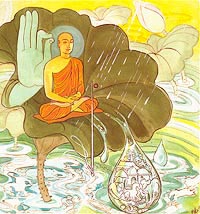
Verse 401. He Is A Brahmana Who Clings Not To Sensual Pleasures
Like water on a lotus leaf,
or mustard seed on needle point,
whoso clings not to sensual things,
that one I call a Brahmin True.
Explanation: The water does not get attached
to the surface of the lotus leaf. The mustard seed does not get attached
to the point of a needle. In the same way, the wise one’s mind does
not get attached to sensual pleasure. Such a non-attached person I describe
as the true brahmana .
Verse 401. He Is A Brahmana Who Clings Not To Sensual Pleasures
Like water on a lotus leaf,
or mustard seed on needle point,
whoso clings not to sensual things,
that one I call a Brahmin True.
Explanation: The water does not get attached to the surface of the lotus leaf. The mustard seed does not get attached to the point of a needle. In the same way, the wise one’s mind does not get attached to sensual pleasure. Such a non-attached person I describe as the true brahmana .
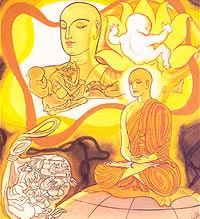
Verse 402. A Brahmana Is He Who Has Laid The Burden Aside
Whoso in this world comes to know
cessation of all sorrow,
laid down the burden, freed from bonds,
that one I call a Brahmin True.
Explanation: He has become aware, in this world itself, the
end of suffering. He is unburdened: he has put down the load. He has
got disengaged from the bonds that held him. I call that person a
true brahmana.
Verse 402. A Brahmana Is He Who Has Laid The Burden Aside
Whoso in this world comes to know
cessation of all sorrow,
laid down the burden, freed from bonds,
that one I call a Brahmin True.
Explanation: He has become aware, in this world itself, the end of suffering. He is unburdened: he has put down the load. He has got disengaged from the bonds that held him. I call that person a true brahmana.
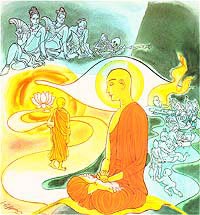
Verse 403. A Brahmana Is He Who Has Reached His Ultimate Goal
Whose knowledge is deep, who’s wise,
who’s skilled in ways right and wrong,
having attained the highest aim,
that one I call a Brahmin True.
Explanation: He possesses profound wisdom. He is full of insight.
He is capable of discriminating the right path from the wrong path.
He has reached the highest state. I call that person a true brahmana.
Verse 403. A Brahmana Is He Who Has Reached His Ultimate Goal
Whose knowledge is deep, who’s wise,
who’s skilled in ways right and wrong,
having attained the highest aim,
that one I call a Brahmin True.
Explanation: He possesses profound wisdom. He is full of insight. He is capable of discriminating the right path from the wrong path. He has reached the highest state. I call that person a true brahmana.
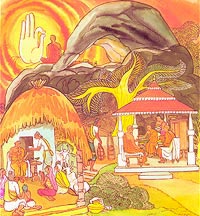
Verse 404. A Brahmana Is He Who Has No Intimacy With Any
Aloof alike from laity
and those gone forth to homelessness,
who wanders with no home or wish,
that one I call a Brahmin True.
Explanation: He does not establish extensive contact either
with laymen or with the homeless. He is not attached to the way of
life of the householder. He is content with the bare minimum of needs.
I call that person a true brahmana.
Verse 404. A Brahmana Is He Who Has No Intimacy With Any
Aloof alike from laity
and those gone forth to homelessness,
who wanders with no home or wish,
that one I call a Brahmin True.
Explanation: He does not establish extensive contact either with laymen or with the homeless. He is not attached to the way of life of the householder. He is content with the bare minimum of needs. I call that person a true brahmana.
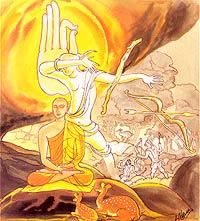
Verse 405. A Brahmana Is He Who Is Absolutely Harmless
Who blows to beings has renounced
to trembling ones, to bold,
who causes not to kill nor kills,
that one I call a Brahmin True.
Explanation: He has discarded the rod and set aside the weapons.
He does not hurt neither the frightened, timid beings, nor stubborn,
fearless beings. I call that person a brahmana.
Verse 405. A Brahmana Is He Who Is Absolutely Harmless
Who blows to beings has renounced
to trembling ones, to bold,
who causes not to kill nor kills,
that one I call a Brahmin True.
Explanation: He has discarded the rod and set aside the weapons. He does not hurt neither the frightened, timid beings, nor stubborn, fearless beings. I call that person a brahmana.
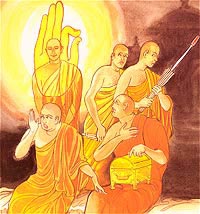
Verse 406. A Brahmana Is He Who Is Friendly Amongst The Hostile
Among the hostile, friendly,
among the violent, cool
detached amidst the passionate,
that one I call a Brahmin True.
Explanation: Being friendly even among the hostile. Free from
hostility, violence and passionate grasping, one emerges a true brahmin.
Verse 406. A Brahmana Is He Who Is Friendly Amongst The Hostile
Among the hostile, friendly,
among the violent, cool
detached amidst the passionate,
that one I call a Brahmin True.
Explanation: Being friendly even among the hostile. Free from hostility, violence and passionate grasping, one emerges a true brahmin.
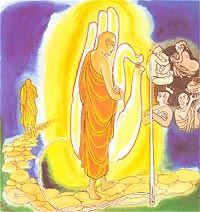
Verse 407. A Brahmana Is He Who Has Discarded All Passions
From whomever lust and hate,
conceit, contempt have dropped away,
as mustard seed from a point of a needle,
that one I call a Brahmin True.
Explanation: His mind does not accept such evils as lust,
ill-will, pride and ingratitude. In this, his mind is like a point
of a needle that just does not grasp a mustard seed. An individual
endowed with such a mind I describe as a brahmana.
Verse 407. A Brahmana Is He Who Has Discarded All Passions
From whomever lust and hate,
conceit, contempt have dropped away,
as mustard seed from a point of a needle,
that one I call a Brahmin True.
Explanation: His mind does not accept such evils as lust, ill-will, pride and ingratitude. In this, his mind is like a point of a needle that just does not grasp a mustard seed. An individual endowed with such a mind I describe as a brahmana.
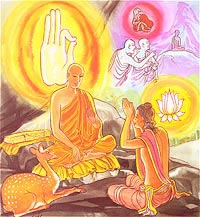
Verse 408. A Brahmana Is He Who Gives Offence To None
Who utters speech instructive,
true and gentle too,
who gives offence to none,
that one I call a Brahmin True.
Explanation: His speech is true. His words are well-meaning,
constructive and not harsh. By his words he will not give offence
to anyone. Nor will his words provoke people. Such a person I declare
a true brahmana.
Verse 408. A Brahmana Is He Who Gives Offence To None
Who utters speech instructive,
true and gentle too,
who gives offence to none,
that one I call a Brahmin True.
Explanation: His speech is true. His words are well-meaning, constructive and not harsh. By his words he will not give offence to anyone. Nor will his words provoke people. Such a person I declare a true brahmana.
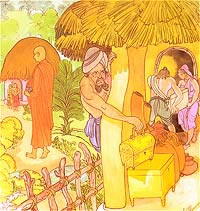
Verse 409. A Brahmana Is He Who Steals Not
Who in the world will never take
what is not given, long or short,
the great or small, the fair or foul,
that one I call a Brahmin True.
Explanation: In this world if there is some person who does
not take anything that is not given, whether long or short, minute
or large or good or bad, him I declare a true brahmana.
Verse 409. A Brahmana Is He Who Steals Not
Who in the world will never take
what is not given, long or short,
the great or small, the fair or foul,
that one I call a Brahmin True.
Explanation: In this world if there is some person who does not take anything that is not given, whether long or short, minute or large or good or bad, him I declare a true brahmana.
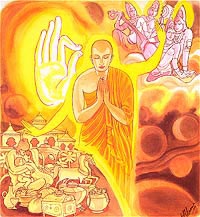
Verse 410. A Brahmana Is He Who Is Desireless
In whom there are no longings found
in this world or the next,
longingless and free from bonds,
that one I call Brahmin True.
Explanation: He has no yearnings either for this world or
for the next. He is free from earning and greed. He is disengaged
from defilements. Such a person I declare a fine brahmana.
Verse 410. A Brahmana Is He Who Is Desireless
In whom there are no longings found
in this world or the next,
longingless and free from bonds,
that one I call Brahmin True.
Explanation: He has no yearnings either for this world or for the next. He is free from earning and greed. He is disengaged from defilements. Such a person I declare a fine brahmana.
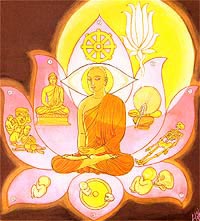
Verse 411. In Whom There Is No Clinging
In whom there is no dependence found,
with Final Knowledge freed from doubt,
who’s plunged into the Deathless depths,
that one I call a Brahmin True.
Explanation: He has no attachments - no attachments can be
discovered in him. He has no spiritual doubts due to his right awareness,
He has entered the deathless - Nibbana. I describe him, a true brahmana.
Verse 411. In Whom There Is No Clinging
In whom there is no dependence found,
with Final Knowledge freed from doubt,
who’s plunged into the Deathless depths,
that one I call a Brahmin True.
Explanation: He has no attachments - no attachments can be discovered in him. He has no spiritual doubts due to his right awareness, He has entered the deathless - Nibbana. I describe him, a true brahmana.
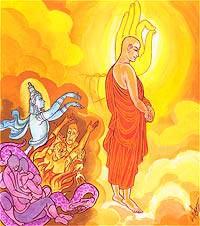
Verse 412. Above Both Good And Evil
Here who’s gone beyond both bonds
to goodness and evil too,
is sorrowless, unsullied, pure
that one I call a Brahmin True.
Explanation: If any person in this world has travelled beyond
both good and the bad, and the attachments, and if he is without sorrow,
and is bereft of blemishes, and is pure, him I describe as a true
brahmana.
Verse 412. Above Both Good And Evil
Here who’s gone beyond both bonds
to goodness and evil too,
is sorrowless, unsullied, pure
that one I call a Brahmin True.
Explanation: If any person in this world has travelled beyond both good and the bad, and the attachments, and if he is without sorrow, and is bereft of blemishes, and is pure, him I describe as a true brahmana.
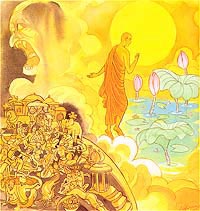
Verse 413. Learning The Charm
Who, like the moon, unblemished, pure,
is clear and limpid, and in whom
delights in being a consumed,
that one I call a Brahmin True.
Explanation: He is like the moon at the full - spotless and
free of blemishes. He is pure, calm, serene and exceptionally tranquil.
He is has got rid of the craving that takes delight in the cycle of
existence. That person I declare a true brahmana.
Verse 413. Learning The Charm
Who, like the moon, unblemished, pure,
is clear and limpid, and in whom
delights in being a consumed,
that one I call a Brahmin True.
Explanation: He is like the moon at the full - spotless and free of blemishes. He is pure, calm, serene and exceptionally tranquil. He is has got rid of the craving that takes delight in the cycle of existence. That person I declare a true brahmana.
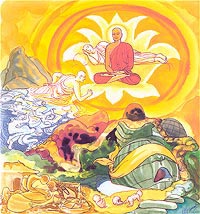
Verse 414. The Tranquil Person
Who’s passed this difficult path,
delusion’s bond, the wandering-on,
who’s crossed beyond , contemplative,
uncraving with no questioning doubt,
no clinging’s fuel so cool become,
that one I call a Brahmin true.
Explanation: He has crossed over the quagmire of passion.
He has gone beyond the difficult terrain of blemishes, that is hard
to traverse and has crossed the cycle of existence. He is fully and
totally reached the other shore. He is a meditator and is bereft of
craving. His spiritual doubts are resolved. He is no longer given
to grasping. He is cooled. Such a person I describe as a true brahmana.
Verse 414. The Tranquil Person
Who’s passed this difficult path,
delusion’s bond, the wandering-on,
who’s crossed beyond , contemplative,
uncraving with no questioning doubt,
no clinging’s fuel so cool become,
that one I call a Brahmin true.
Explanation: He has crossed over the quagmire of passion. He has gone beyond the difficult terrain of blemishes, that is hard to traverse and has crossed the cycle of existence. He is fully and totally reached the other shore. He is a meditator and is bereft of craving. His spiritual doubts are resolved. He is no longer given to grasping. He is cooled. Such a person I describe as a true brahmana.
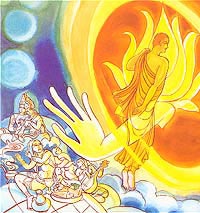
Verse 415. Freed From Temptation
Who has abandoned lusting here
as homeless one renouncing all,
with lust and being quite consumed,
that one I call a Brahmin True.
Explanation: Rejecting pleasure, homeless he goes to life’s
journey’s end. Him, I call a Brahmin True.
Verse 415. Freed From Temptation
Who has abandoned lusting here
as homeless one renouncing all,
with lust and being quite consumed,
that one I call a Brahmin True.
Explanation: Rejecting pleasure, homeless he goes to life’s journey’s end. Him, I call a Brahmin True.
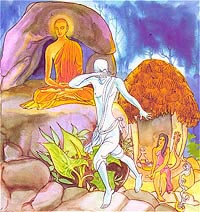
Verse 416. The Miracle Rings
Who has abandoned lusting here
as homeless one renouncing all,
with lust and being quite consumed,
that one I call a Brahmin True.
Explanation: In this world, he has taken to the life of a
wandering ascetic. He has got rid of the craving to continue the cycle
of existence. I describe that person as a true brahmana.
Verse 416. The Miracle Rings
Who has abandoned lusting here
as homeless one renouncing all,
with lust and being quite consumed,
that one I call a Brahmin True.
Explanation: In this world, he has taken to the life of a wandering ascetic. He has got rid of the craving to continue the cycle of existence. I describe that person as a true brahmana.
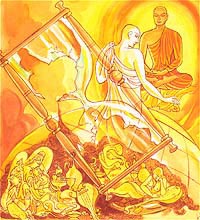
Verse 417. Beyond All Bonds
Abandoned all human bonds
and gone beyond the bonds of gods,
unbound one is from every bond,
that one I call a Brahmin True.
Explanation: He has given up the bonds that bind him to humanity.
He has gone beyond the bonds of attachment to life in heaven as well.
This way, he is disengaged from all bonds. I declare such a person
a brahmana.
Verse 417. Beyond All Bonds
Abandoned all human bonds
and gone beyond the bonds of gods,
unbound one is from every bond,
that one I call a Brahmin True.
Explanation: He has given up the bonds that bind him to humanity. He has gone beyond the bonds of attachment to life in heaven as well. This way, he is disengaged from all bonds. I declare such a person a brahmana.
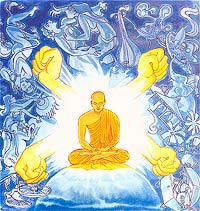
Verse 418. The Person Whose Mind Is Cool
Abandoned boredom and delight,
become quite cool and assetless,
a hero, All-worlds-Conqueror,
that one I call a Brahmin True.
Explanation: He has given up lust. He has also given up his
disgust for the practice of meditation. This way, he is both lustful
and lustres. He has achieved total tranquillity. He is devoid of the
blemishes that soil the hand. He has conquered all the world and is
full of effort. I call that person a brahmana.
Verse 418. The Person Whose Mind Is Cool
Abandoned boredom and delight,
become quite cool and assetless,
a hero, All-worlds-Conqueror,
that one I call a Brahmin True.
Explanation: He has given up lust. He has also given up his disgust for the practice of meditation. This way, he is both lustful and lustres. He has achieved total tranquillity. He is devoid of the blemishes that soil the hand. He has conquered all the world and is full of effort. I call that person a brahmana.
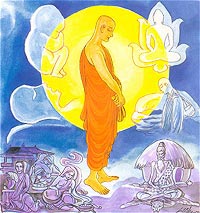
Verse 419. Diviner Of Rebirth
Who knows how clutching creatures die
to reappear in many a mode,
unclutching then, sublime, Awake,
that one I call a Brahmin True.
Explanation: He knows the death and birth of beings in every
way. He is not attached to either birth or death. He has arrived at
the proper destination. He possesses the knowledge of the essences.
This person I describe as a brahmana.
Verse 419. Diviner Of Rebirth
Who knows how clutching creatures die
to reappear in many a mode,
unclutching then, sublime, Awake,
that one I call a Brahmin True.
Explanation: He knows the death and birth of beings in every way. He is not attached to either birth or death. He has arrived at the proper destination. He possesses the knowledge of the essences. This person I describe as a brahmana.
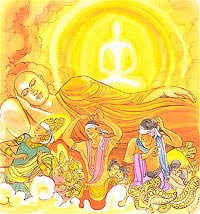
Verse 420. Destroy Unknown
Whos destination is unknown
to humans, spirits or to gods,
pollutions stayed, an Arahant,
that one I call a Brahmin True.
Explanation: Their path, neither gods, nor spirits, nor humans
can fathom. Their taints are totally eradicated. They have attained
the higher spiritual state. This person I declare a brahmana.
Verse 420. Destroy Unknown
Whos destination is unknown
to humans, spirits or to gods,
pollutions stayed, an Arahant,
that one I call a Brahmin True.
Explanation: Their path, neither gods, nor spirits, nor humans can fathom. Their taints are totally eradicated. They have attained the higher spiritual state. This person I declare a brahmana.
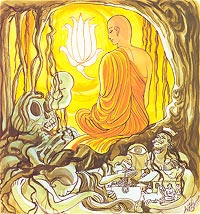
Verse 421. He Yearns For Nothing
That one who’s free of everything
that’s past, that’s present, yet to be,
who nothing owns, who’s unattached,
that one I call a Brahmin True.
Explanation: Their path, neither gods, nor spirits, nor humans
can fathom. Their taints are totally eradicated. They have attained
the higher spiritual state. This person I declare a brahmana.
Verse 421. He Yearns For Nothing
That one who’s free of everything
that’s past, that’s present, yet to be,
who nothing owns, who’s unattached,
that one I call a Brahmin True.
Explanation: Their path, neither gods, nor spirits, nor humans can fathom. Their taints are totally eradicated. They have attained the higher spiritual state. This person I declare a brahmana.
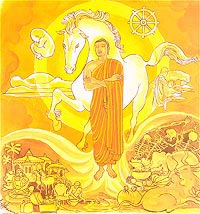
Verse 422. He Who Is Rid Of Defilements
One noble, most excellent, heroic too,
great sage and one who conquers all,
who’s faultless, washed, one Awake,
that one I call a Brahmin True.
Explanation: He is a great sage as he has
realized the essentials. He has conquered death. He is devoid of blemishes.
He has washed away all evil. He has awakener to the essentials. That person,
I describe as a brahmana.
Verse 422. He Who Is Rid Of Defilements
One noble, most excellent, heroic too,
great sage and one who conquers all,
who’s faultless, washed, one Awake,
that one I call a Brahmin True.
Explanation: He is a great sage as he has realized the essentials. He has conquered death. He is devoid of blemishes. He has washed away all evil. He has awakener to the essentials. That person, I describe as a brahmana.
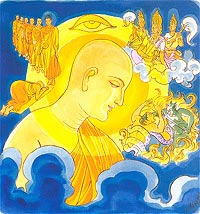
Verse 423. The Giver And Receiver Of Alms
Who so does know of former lives
and sees the states of bliss and woe
and then who’s reached the end of births,
a sage supreme with wisdom keen,
complete in all accomplishments,
that one I call a Brahmin True.
Explanation: He knows his former existences. He has the capacity
to see heaven and hell - states of ecstasy and states of woe. He has
ended the cycle of existences. He has his higher awareness. He has
reached the state of a sage. He has achieved the final perfection.
Him I describe as a brahmana.
Verse 423. The Giver And Receiver Of Alms
Who so does know of former lives
and sees the states of bliss and woe
and then who’s reached the end of births,
a sage supreme with wisdom keen,
complete in all accomplishments,
that one I call a Brahmin True.
Explanation: He knows his former existences. He has the capacity to see heaven and hell - states of ecstasy and states of woe. He has ended the cycle of existences. He has his higher awareness. He has reached the state of a sage. He has achieved the final perfection. Him I describe as a brahmana.

